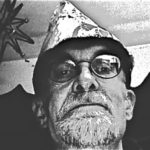Minnesota Winter Evenings
 I.
I.
Some winter evenings I stand on a lake’s edge under bright-black Iron Range sky wondering about walking across that ice, over the train tracks along the far shore, into those woods, and away. What if I wandered until weary, laid down under a pine tree, then breathed easy until one by one my atoms drifted off into moonlight and air? Could I become birch smoke? Would a resting black bear or hunting fox know me among everything else it inhales? Most often on those nights I just look at the outside from inside, through my mother-in-law’s living room window after everyone else has gone to bed. When the TV and lights are off I can see down her back yard and past the dock we pulled out of Colby Lake in October and will push back into it come late May or early June. Snow on lake ice glows blue-gray under black pine silhouettes. Sky glows black. Abashed by comfort and warmth, I tell myself to get dressed and ski out the eastern end of Colby into the Partridge River. Or ride fat tires across Whitewater Lake or along the Bird Lake Trail or up and down the Moose Line Road. Then I admit my lack of will. Then I stand there for a couple more minutes, trying to make sure I can remember what that outside looks and feels like so my brain can reproduce the sensation long after the last time I’ve seen it. Then I go to bed and struggle to sleep.
II.
Smoke rose silver-grey and perfectly straight from every house’s chimney into 35-below sky as I drove home on deserted northwest Rochester streets after midnight in early January 1990.
III.
A few years ago our aging husky-boxer mix woke me up past midnight under a full moon. I let her out the front door and we both stood quietly in the middle of Chester Park Drive where it dead ends. She raised her nose slightly to learn things you and I will never know, then leveled her head and calmly but intentionally looked around. We wandered up to where the road ends and overlooks Skyline Drive and Chester Creek. We could see the Lift Bridge and Superior’s twinkling lights. Everything was so still. No traffic was about. Lights changed for no one in the silent intersection of College Street, Junction Avenue, and Nineteenth Avenue East. After a moment we walked back home. Bare maple branches cast such vivid shadows in bright blue snow on those nights.
IV.
Back in 1996, past 9:00 p.m. on a Sunday night below 10 degrees, I clomped beyond the lighted Lester Park cross-country skiing loops. I was even more clumsy on skis than I am now. I knew nothing about headlamps or dressing for exercise in cold weather. I did know I had no idea what I was doing. I’d fallen a few times. A couple crashes had been those tangly ones that create human-body-shaped divots and evidence of flailing in the woods at the bottom of icy downhills. While trying to keep my balance I pondered scenarios. What if I snapped my ankle next time I went down? What if I conked my head on an exposed rock or cracked my ribs on a downed tree? Could I survive overnight, if I had to, in chintzy wind pants and multiple layers of long-sleeve cotton T-shirts? What if some James Bond villains — svelte, elite skiers clad all in black and swarming swiftly along the trail — started pursuing me? Could I escape? Could I fight them off with my bamboo poles? Could I fend off a wolf from a Jack London story if she discovered me in my vulnerable broken-ankle-and-concussion state? I considered those and other very realistic situations for a while, then stopped thinking about what I bad skier I was and stood still and breathed and looked at the stars and realized without realizing it that winter night air carries ancient information.
V.
I have shoveled so many sidewalks and driveways lit by porch lamps and the moon. I feel the same way now, when I take a break to catch my breath and look at what I’ve done and still need to do, as I felt when I was a teenager taking the same break in the 1980s. I bet I’d have felt the same way pausing from the same work in the 1950s or 1920s or 1890s. I expect to feel the same way 30 years from now. I’ll be dead 30 years from then. Cold night air must feel the same now as it always has felt. If I look up while shoveling tonight — if all I can see against the black sky are black cedar branches and stars — I’m seeing the same things human and animal eyes have seen for longer than I can comprehend. Mystical ancients live among us, eh?
VI.
I remember kissing and being kissed in cold night air that turns warm, soft breath into luminous silver clouds.
VII.
On a 20-degree Friday night in January or February 2014 I fat-biked the frozen Lester River from Jean Duluth Road to Lester Park. Shallow windswept snow patches along the river glowed blue-white under a big, bright moon I wanted to lay under and stare at until who and what I am had evaporated. Long lanes of snowless ice shined black and slick. I walk-slid the bike along some especially slippery stretches, but the surface was mostly tacky enough to ride slowly on those wide, soft tires. It was also solid enough not to budge against my right elbow the couple-three times both tires slipped out from under me. I went through once, a mile or so from the park. It was less scary than it might sound. Every now and then I took iPhone photos I hoped but knew would not convey what the dusklight and moonlight — the process of winter sky fading through blues and indigos and violets into black — felt like in my eyes and chest. I frequently try to describe or show fellow human beings how certain forms of light feel to me. Never as often as I feel compelled to, but a lot. I never get it right. I find my compulsion for expressing the supposed specialness of my feelings deeply unappealing. I’ll probably keep trying. Some part of me remains a teenager who feels entitled to being seen and understood as beautifully unique among all human beings who have ever existed. Some part of my brain tells me that if I could just put the perfect words to what that light feels like, or if I learned how to make a photo or a painting of it, everything would feel OK for once. It wouldn’t. No perfect description or depiction — of light, of music, or of anything else — would satisfy me. It wouldn’t help me feel more connected to anyone or anything else I wish I felt connected to. After achieving it I would almost immediately again feel restless and dissatisfied. Because accurate representation isn’t really the thing I desperately want. It’s not that I simply want someone to get how I feel about, say, the way dying sun sets trees on fire from within, or the way winter moonglow shows the meaning in supposedly mundane Chester Park rooftops. It’s that I want to capture that light. I want to own it.
Recommended Links:
Leave a Comment
Only registered members can post a comment , Login / Register Here













2 Comments
FranceneStarr
about 6 years agoMatthijs
about 6 years ago